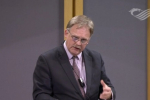With Liver disease mortality rates having doubled in the last two decades and liver cancer deaths having almost doubled (93%) in just 10 years between 2010 and 2020, Welsh Conservatives have today called on the Welsh Government “to double prevention efforts, accelerate earlier detection of liver disease in primary care, and expand Alcohol Care Teams across health boards to help those in critical need of support”.
In their Senedd Debate on Liver Disease this afternoon, they also urged the Minister to deliver a long-term funding settlement to recruit, train and retain a specialist workforce that is equitably distributed and resilient.
Closing the Debate, North Wales MS Mark Isherwood also emphasised that Wales is now the only UK nation not to have a target of achieving Hepatitis C elimination, and called on the Welsh Government to respond to Hepatitus C Trust’s call for a national elimination strategy setting out a clear route-map to achieving Hepatitis C elimination by 2030 at the latest and a Hepatitis C awareness campaign. Hepatitis C primarily affects the Liver.
Speaking in the Senedd in ‘Love Your Liver awareness month’ and on the ‘National Awareness Raising Day for the Less Survivable Cancers’, Mr Isherwood said:
“The number of people diagnosed with liver disease in Wales more than tripled between 2002 and 2021, rising to 53,261 people. Wales has the highest mortality rate due to liver disease in the UK. Liver disease deaths in Wales continue to rise, with mortality rates surging by 23% between 2019 and 2021. The problem is particularly acute in Betsi Cadwaladr University Health Board, where hospital admission rates due to liver disease are 15% above the national average and liver cancer mortality rates are 50% higher than the national average in Wales.
“As we have heard, It is vital the Welsh Government publishes a timetable for the delivery of outcomes set out in its Quality Statement on Liver Disease, following the increased prevalence of liver disease amongst the Welsh population.
“Despite 90% of liver disease being preventable, the number of people dying from the disease has doubled in the last two decades and increased by 400% in people aged 65 and under, with 9 in 10 liver cancer patients dying within 5 years of being diagnosed.
“With mortality rates having increased since the previous policy was published, Welsh Ministers must seek to improve prevention of the disease, including : doubling of the hepatology workforce, including liver nurse specialists, to address huge variation in access to specialist care; seven day alcohol care teams in place in all Health Boards to meet local need; and adoption of the All Wales Abnormal Liver Blood Test Pathway by all GPs to improve the early detection of liver disease.”
He added:
“Hepatitis C is a blood-borne virus that can cause a range of health impacts but primarily affects the liver. Although it is preventable, treatable and curable, we heard figures from the Hepatitis C Trust showing that Wales is now the only UK nation not to have a target of achieving Hepatitis C elimination in advance of the World Health Organization’s 2030 target, with England and Northern Ireland having set an ambition of elimination by 2025 and Scotland by the even more ambitious target of 2024.
“By contrast, recent modelling found that continuation of current treatment rates in Wales would mean elimination will not be reached until at least 2040. As they have stated again for this Debate, “the Welsh Government should implement the recommendations made by the Health, Social Care and Sport Committee following its inquiry into Hepatitis C in Wales, including producing a national elimination strategy setting out a clear route-map to achieving hepatitis C elimination by 2030 at the latest and launching a Hepatitis C awareness campaign”.
“Wales has a Liver Disease and Liver Cancer Public Health Emergency. •
“The motion put forward today is ambitious but necessary to keep pace with the rising scale and severity of the liver disease and liver cancer public health crisis. As the British Liver Trust state in their correspondence to all Members, ‘We would ask Members to vote in favour of the motion as tabled’.”
Labour defeated the motion as tabled.
